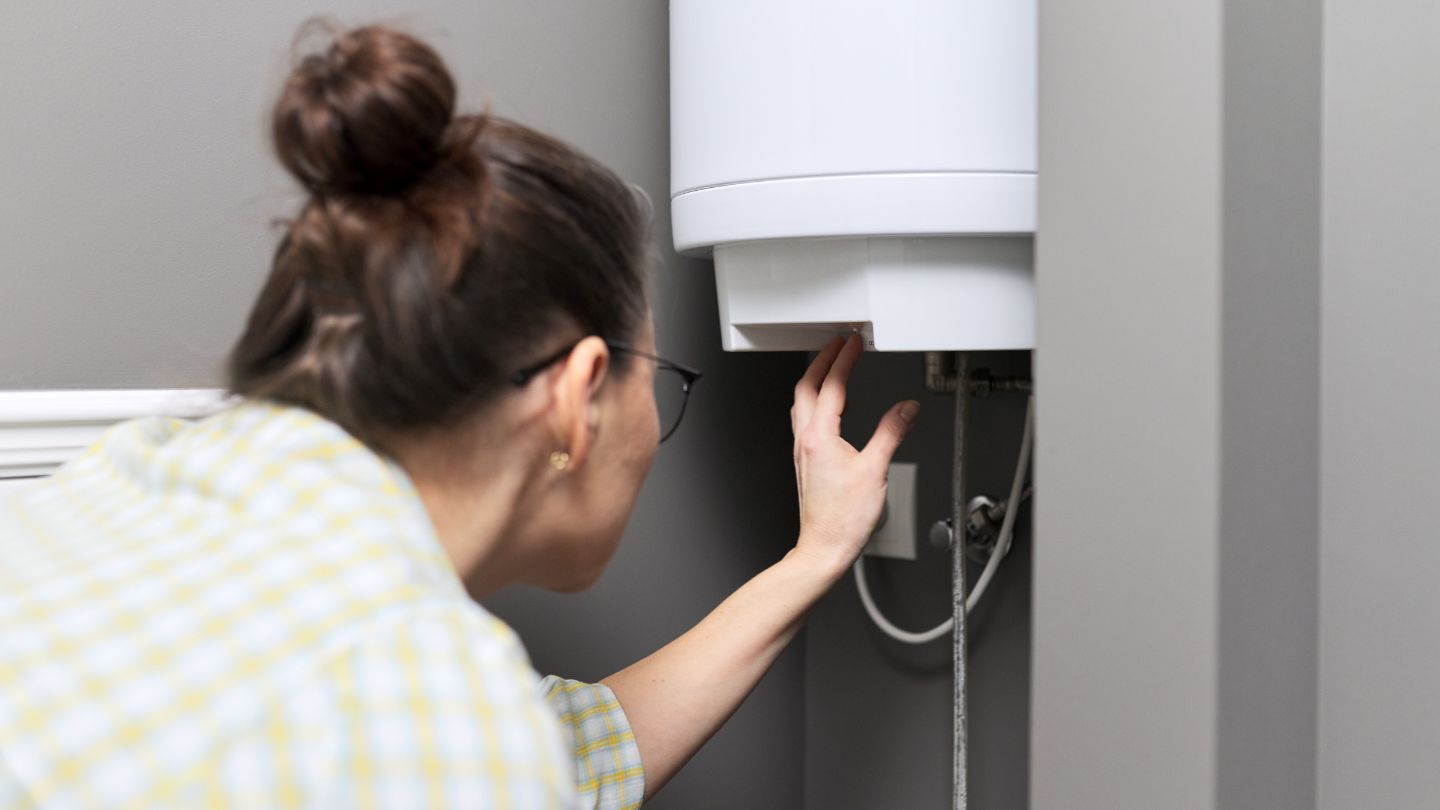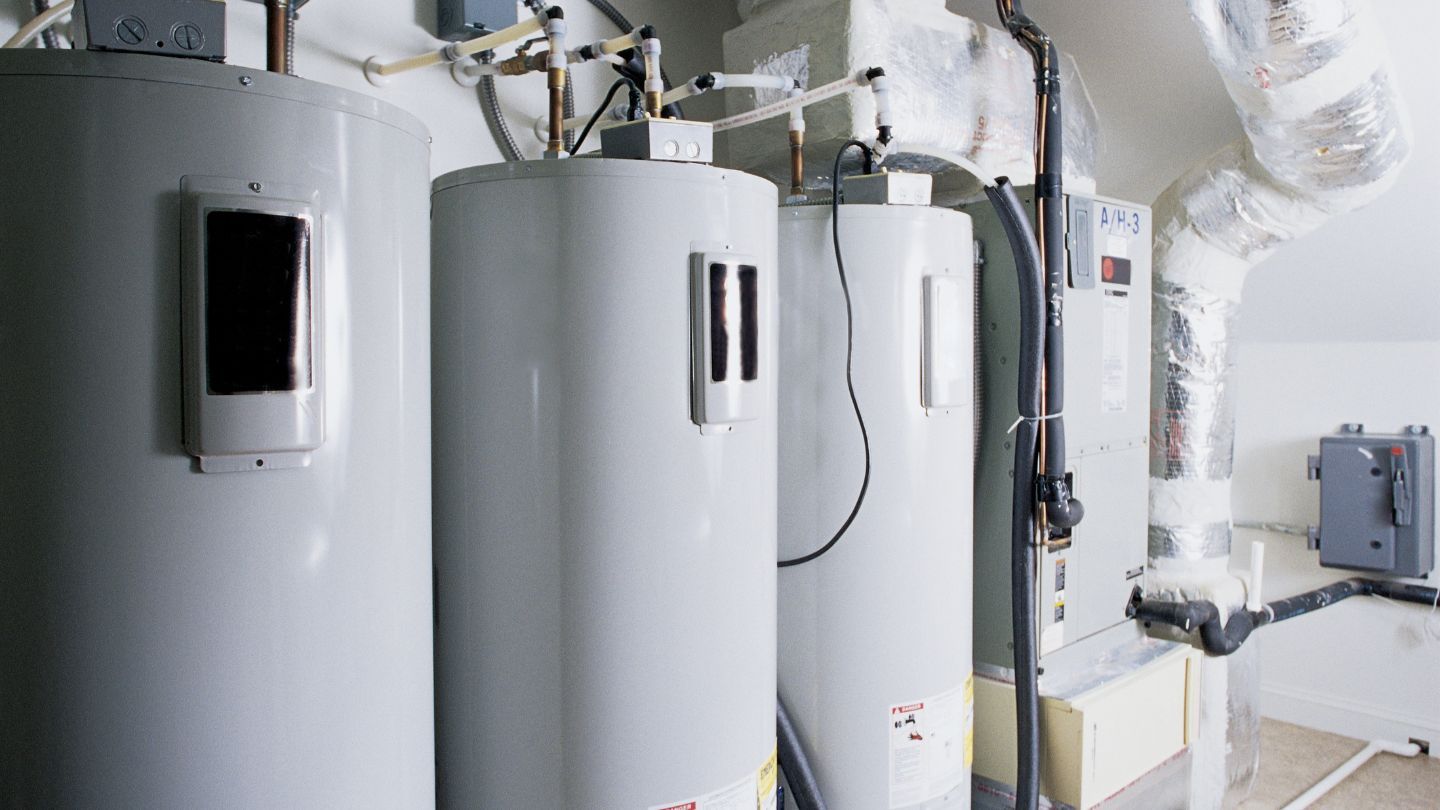Are you considering a new water heater? With so many types of water
heaters available, selecting the best one can feel overwhelming. This guide
simplifies the decision-making process, helping you choose the ideal option
based on your household needs, energy efficiency preferences, and budget.
Understanding the types of water heaters is essential for making an
informed decision. Below are the most common options, along with their benefits
and key features.
Key Takeaways
- Choose
a water heater based on household size, energy efficiency, and budget.
- Tankless
and solar water heaters offer high energy efficiency and cost savings.
- Regular
maintenance ensures optimal performance and longevity of your water
heater.
Tank Water Heaters
Tank water heaters, also known as storage water heaters, are traditional
and widely used systems. Cold water enters the tank from the bottom, where it
is then heated and stored until needed. These conventional water heaters store
heated water in an insulated tank, making them ideal for residential water
heaters.
- Capacity:
Available in various sizes, typically 30 to 100 gallons.
- Fuel
Options: Powered by either natural gas or electricity.
- Energy
Efficiency: Require regular maintenance, such as
flushing the tank, to maintain efficiency.
- Key
Benefit: Provide reliable hot water for households of
all sizes.
Natural Gas Tank Water Heaters
Natural gas water heaters are a popular choice for their ability to heat
water quickly and efficiently. They use a gas burner to heat the tank's water
supply.
- Cost-effective
operation compared to electric models.
- Ideal
for homes with an existing gas line.
- Provide
a steady supply of hot water, even in cold climates.
Electric Tank Water Heaters

Electric water heaters are easy to install and work with electric
heating elements to heat the water.
- Suitable
for areas without access to natural gas.
- Offer
energy-efficient performance with lower upfront costs.
- Reliable
for residential water heaters in small to medium-sized households.
Tankless Water Heaters
Tankless water heaters provide hot water on demand without the need for
a storage tank. These systems heat water only when needed, offering
significantly less energy consumption compared to conventional heaters.
- Energy
Efficiency: Can reduce energy costs by up to 34% for
households using less than 41 gallons of hot water daily.
- Compact
Design: Perfect for homes with limited space.
- Continuous
Supply: Ideal for larger families when paired with
multiple units.
Heat Pump Water Heaters
Heat pump water heaters are among the most energy-efficient options
available, using ambient air to heat water instead of relying solely on
electricity.
- Energy
Savings: Use up to 60% less energy than traditional
water heaters.
- Best
Locations: Perform well in warm spaces, such as
basements or furnace rooms.
- Additional
Benefits: It can also help cool and dehumidify the
surrounding area.
Solar Water Heaters
Solar water heaters harness the sun's energy to produce hot water,
making them an eco-friendly and cost-effective choice.
- Energy
Source: Powered by solar panels and ideal for sunny
regions.
- Cost
Savings: Lower energy bills and potential federal and
local rebates.
- Backup
Options: Equipped with auxiliary systems for cloudy
or cold spaces.
Hybrid Water Heaters
Hybrid water heaters combine heat pump technology with electric heating
elements to maximize energy efficiency.
- Dual
Functionality: Automatically switches between modes based
on demand.
- Rebates
Available: Eligible for federal and local rebates.
- Lifespan:
Last up to 15 years with proper maintenance.
Condensing Water Heaters
Condensing water heaters capture and reuse exhaust gases to heat water,
making them highly energy efficient.
- Ideal
for homes that rely on natural gas.
- Best
suited for households with high hot water demands.
- Reduced
energy consumption leads to lower energy bills.
Point-of-Use Water Heaters

Point-of-use water heaters are compact units designed to provide heated
water directly to a specific fixture.
- Fast
Access: Deliver instant hot water at sinks, showers,
or appliances.
- Energy
Efficiency: Avoid standby energy loss.
- Space-saving:
Easily installed under counters or in tight spaces.
Factors to Consider
Selecting the best type of water heater involves several considerations:
- Household
Size: Larger families may benefit from a
storage-tank water heater or multiple tankless models.
- Energy
Efficiency: Options like solar, hybrid, or heat pump
water heaters help reduce energy consumption.
- Budget:
Evaluate the balance between upfront costs and long-term energy savings.
- Climate:
Certain systems, such as solar water heaters, perform best in warmer
regions.
- Space
Constraints: If space is limited, consider a tankless
water heater or a compact storage-tank water heater. These options are
ideal for small homes or apartments where space is at a premium.
- Hot
Water Demand: For larger families or homes with high hot
water usage, a water heater with a higher capacity, such as a tank water
heater, may be necessary to meet your needs.
- Fuel
Type: Decide on the fuel type that suits your home
and preferences. Natural gas, heat pumps, and solar water heaters are
popular choices, each with its own benefits and considerations.
- Maintenance
and Repair: Consider the maintenance requirements of the
water heater. Tankless water heaters, for example, may need more frequent
maintenance compared to traditional tank models.
Ultimately, choosing the right water heater depends on your specific
household needs, ensuring efficiency and comfort within your budget.
Read more: How Do Tankless Water Heaters Work? Expert Insights and Benefits
Maintenance and Repair
Regular maintenance is crucial to keep your water heater running
efficiently and prolong its lifespan. While some homeowners may attempt DIY
maintenance, it's always best to rely on professional expertise for optimal
results. Here are some essential maintenance and repair tips that our skilled
technicians can assist you with:
- Check
the Temperature and Pressure Relief Valve:
Our professionals will regularly inspect the temperature and pressure
relief valve to ensure it's functioning correctly. This valve is vital for
preventing excessive pressure buildup in the tank.
- Inspect
the Storage Tank: We look for signs of corrosion or damage in
the storage tank. Addressing these issues early with our help can prevent
leaks and extend the life of your water heater.
- Check
the Heating Elements: Our team examines the heating elements
for wear or damage. Replacing faulty elements through our service can
improve the efficiency of your water heater.
- Descale
the Water Heater: We perform regular descaling to remove
mineral buildup, which can reduce efficiency and lead to damage over time.
- Replace
the Anode Rod: The anode rod helps prevent corrosion inside
the tank. Our experts recommend replacing it every 3-5 years to
significantly extend the life of your water heater.
By entrusting these maintenance tasks to our professional services, you
can ensure a reliable supply of hot water while maximizing energy efficiency
and cost savings.
Summary
Selecting the right water heater can greatly enhance your home's comfort
and help reduce energy costs. From conventional tank models to cutting-edge
solar and hybrid water heaters, each type presents distinct advantages suited
to various household needs.
A-Total Plumbing is your go-to expert for tankless
water heater installation near Acworth. Our knowledgeable team is
dedicated to assisting you in choosing the ideal system that aligns with your
preferences and home requirements. Whether you're focused on energy efficiency or maximizing space, we have the solutions you need. Whether you're dealing with House Leaks, Yard Leaks, Water Heater Leaks, Whole House Stoppages, Hot Water Issues, Clogged Drains, Toilet Problems, Faucets, or Gas Leaks, our expert team is here to provide reliable solutions for all your plumbing needs. Contact us today to
discover how we can elevate your home's water heating experience!
Frequently Asked Questions
Can a water heater work in cold climates?
Yes, certain models, such as natural gas water heaters and hybrid
systems, are designed to perform efficiently in colder spaces.
How much hot water does a typical household need?
The average household requires a water heater with a storage tank
capacity of 40 to 80 gallons, depending on the number of residents.
What should I consider when replacing a water heater?
Factors like household size, energy efficiency, available space, and budget are crucial when selecting a new water heater.

